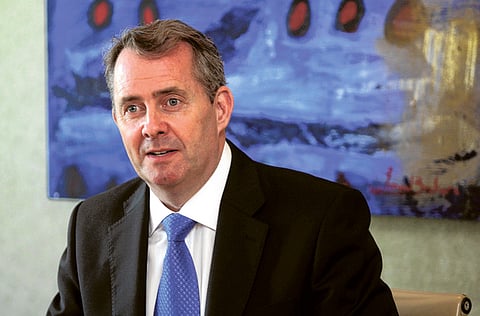Fox defends West's arms sales to Libya
UK Secretary of State for Defence says it's a pity Gaddafi did not take constructive role

Dubai: UK Secretary of State for Defence Liam Fox has defended the West's role in arming Libya, saying it's a "pity" that its leader Colonel Muammar Gaddafi did not take the opportunity of a "constructive role".
"It is a great pity that the regime did not take the chance of a constructive role that a great many countries in the West had hoped; but as we've learned here… the regime has fundamentally failed to reform, it remains the same aggressive, repressive, oppressive group of individuals that many suspected it would be," he told a group of reporters during a visit to Dubai.
Commenting on the previous UK government's attempt to "bring in Gaddafi from the cold", he said it wasn't unreasonable, but at the first opportunity, the Libyan leader had resorted to "the old ways of oppression".
"Gaddafi had said that I'm not a Presidential-type ruler, it's the people who govern this country, it's the people who rule this government, but at the first sign of the people disagreeing with him, he sent planes in to enforce the regime's control," Fox said.
Gulf News previously reported on the European Union/UK arms trade with Libya since the EU-imposed arms embargo was lifted in 2004.
Export licences
According to the Department for Business Innovation & Skills (BIS), £181.7 million (Dh1.09 billion)-worth of arms export licences were granted from the UK to Libya in the third quarter of 2010 — up from £22 million in second quarter. According to a report by the European Network Against Arms Trade (Enaat), in 2009, €9.6 billion (Dh48.6 billion)-worth of arms export licences were issued to the Middle East from European countries.
Fox described Gaddafi as a "liability to his people and to his country" with no legitimacy and no support inside or outside his country. "There's one person standing in the way of peace and reconciliation and that's Gaddafi; and I don't know what he doesn't understand," Fox said, continuing that the international community is against the Libyan leader, the UN has passed two comprehensive resolutions against him and "he has no friends".
"It is merely his own vanity and isolation from reality, which is keeping him where he is," he said.
Fox is currently on a tour of the region, visiting the UAE, Qatar and Bahrain.
He said the aim of the visit is to say thank you to those involved with regional leaders who have helped cement the international coalition politically by supporting the governments and militarily by the contributions they made to the no-fly zone in Libya.
Ground attack
Talks will be ongoing inside Nato, he continued, about how to deal with the "need" for a ground attack with the military, as the US "diminish their assets available".
The US military was ready to withdraw from the air campaign this weekend, as Nato allies took the lead in bombing Gaddafi's forces.
The Defence Secretary said the swift end to the violence in Libya would be for the Gaddafi regime not to inflict death and destruction on its people. If it does continue, "we will continue to do what we can to defend the civilian population, and to degrade his military capability", he said.
“What’s become very clear is that Gaddafi won’t change. He said what the international community wanted to hear, but ultimately was the same deeply repressive character that he’d always been, and it’s a great pity for the Libyan people; because the losers in this are not the international community, it’s the Libyan people.”
Those opposing the long-standing Libyan leader, also shouldn’t be called “rebels”, Fox said. This is because if the international community says the current regime has no legitimacy, then by definition they cannot be rebels. They are the opposition forces, and they have said that they are interim, so they are not putting themselves forward as an alternative Government, he said.
“It’s very clear from the discussions that we’ve had is that what they want is a stable, democratic future for the people of Libya; and let’s hope they get it.”
Human cost: Casualties kept low
UK's Secretary of State for Defence Liam Fox cited a recent air strike on Muammar Gaddafi's armaments as an example of how the UK has taken "enormous care" to minimise civilian casualties.
"We could have degraded Gaddafi much more, if we had less regard for human suffering," he told the journalists during a meeting in Dubai.
In Misrati, he continued, "we could have taken out very many more of Gaddafi's tanks, but we were unwilling to pay the price of civilian casualties to do so. "But I think that it's important we maintain the high moral ground — it's important in the humanitarian way, and it's important in terms of maintaining the political cohesion of the coalition," he said.



